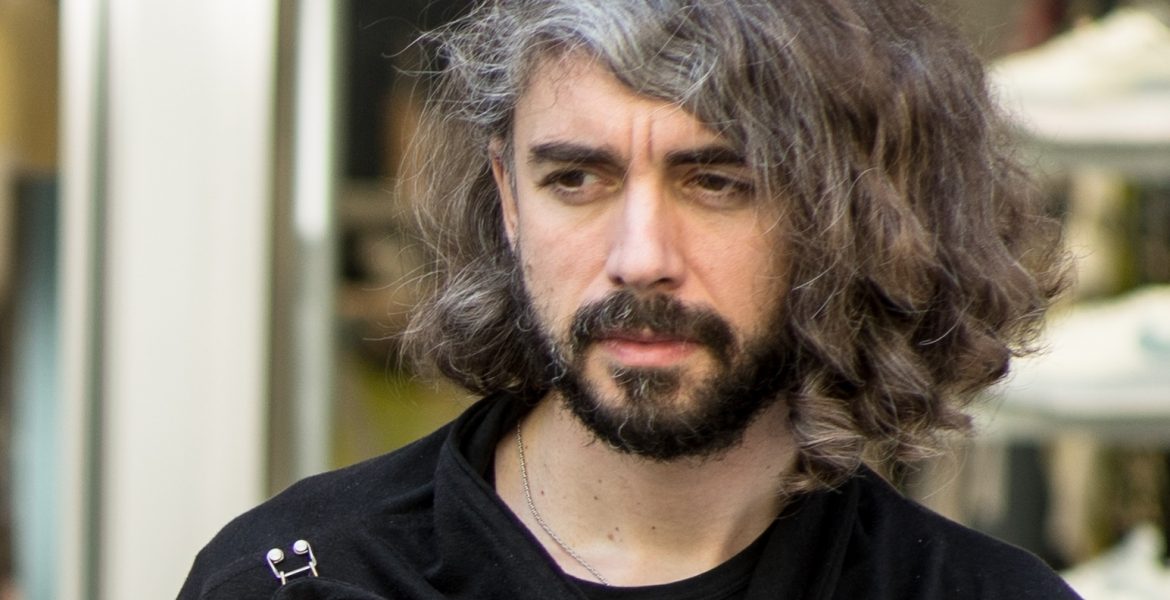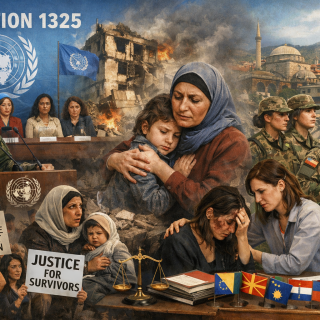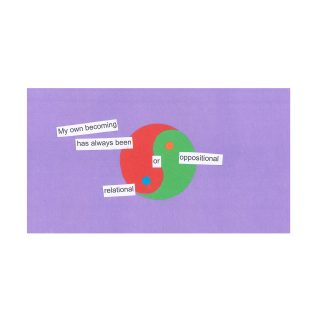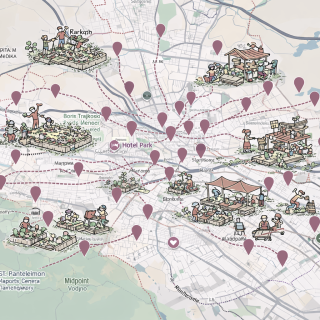They say the train continued on, as if there had been no abduction. As if nothing had happened.
They say that no one rebelled; neither when the armed members of the “avengers” ordered the conductor to stop the train, neither when they got inside, nor when they examined the passengers’ train tickets, which the conductor wrote down the names of the passengers on.
They say that at that moment, when the soldiers who were not paramilitaries (because such never exist), but members of the reserve unit of the Višegrad Brigade of the Army of Republika Srpska, began to take out those who had Bosniak names – all of them citizens of the Federal Republic of Yugoslavia – a man got up from his seat. The man’s name was Tomo Buzov. And in that time of horror and in that place of horror, ethnicity was important – because people were killed just because of their name – he was a Croat, a retired Yugoslav People’s Army officer from Belgrade. Tomo was the one who made that huge difference that exists between 0 and 1 – one that is much bigger than that between 1 and 5. Tomo did not give in – he stood up to them twice. The third time they took him too. The only man among men – the loud minority of the silent majority.
They say that Sanija Zupčević, who stayed on the train with her children, screamed for a long time after her husband Halil was taken away.
They say everyone will remember the silence that followed as the train moved on. As if nothing had happened.
They say that then they took the captured civilians – 20 of them (including the minor Senad Đečević) to the gymnasium of the school in the village of Mušići (Višegrad municipality), where they took off all their clothes, and took away their money and valuables. They say that they were then beaten for more than an hour, and they say that the floor was covered in blood.
They say that they ultimately moved them – half naked and completely blue and bloody – to the village of Prelovo (Višegrad municipality), where they were killed in the yard of Rasim Čehić’s demolished house. They say that all but two of them were shot in the back of the head. One is said to have been shot dead while trying to escape. One of them had his throat cut in an attempt to escape.
They say that it was an ordinary day – in the life of Milan Lukić. Maybe just the same as those two days – in Bikavac, and in Pionirska, in June 1992 in Višegrad. These are the two days known for live bonfires. Yes, people burned in those days.
The courts say that Slobodan Milošević was not responsible, nor Dobrica Ćosić, nor Milan Lukić.
The courts say that only the direct perpetrators are responsible for this crime. The courts say that they cannot deal with determining the responsibility of those who premeditated the crime, those who ordered the crime, those who organized the crime, and especially those who inspired the crime.
They say that still waters run deep. This is not true. Still water carries corpses – the bodies of Rasić Ćorić, Ilijaz Ličina, Jusuf Rastoder and Halil Zupčević.
They say that the Balkan Butcher promised desperate families that he would leave no stone unturned to find their loved ones.
Transitional justice tells us that victims and survivors have the right to the truth and the right to justice, which includes restitution, reparation, and a guarantee that crimes will not happen again.
The facts tell us that this crime was tried on three occasions, in three countries: in Bijelo Polje, 2001, in Sarajevo, 2022, in Belgrade, 2023. I followed the latter trial, which was held before the Special Court for War Crimes.
The facts tell us that the Law on Civilian Victims of the Republic of Serbia does not recognize these victims for two reasons. They say: they were not killed by the enemy army. They say: the crime did not happen on the territory of this country.
I am telling you that in 2004 I was in Prijepolje. I am telling you that in 2008 I was at Štrpci station – the one where train number 671 was stopped on February 27, 1993. It was on the Belgrade – Bar railway. The train stopped at 15:48.
They say it was not a day like any other for the families of those killed.
I am telling you that one Milka Zuličić – whom I have never met – lost her son Zvjezdan. I am telling you that one Selma Memović – whom I have met – lost her father, Fikret Memović.
I’m telling you that I read the letters that Milka wrote[1].
“I don’t know whose citizen I am,” Milka wrote in her letter “Tell us the Truth” to Milošević.
“I will be warning you until I am dead!”, Milka wrote in her “Letter to the Deaf” to Milošević.
“You are silent because you are criminals and you belong in hell,” Milka wrote in her letter “Criminals – Where is the Grave?” to Milošević.
“I am no longer a statistic of Buba Morina and her henchmen.” “Everyone is silent. And silence has always meant approval of the crime.” “Štrpci are silent. The government is silent. Bloody Štrpci. Bloody government.” “There is no law. Our souls are empty, tears are pouring like the rains of Mostar.” “I am waiting for the voice of hope – Zvjezdan is alive.” – All this Milka wrote in her letter “A Cry for Truth”, to Milošević.
Need I say that all Milka’s letters went unanswered? Milošević did not respond to any of the letters.
I tell you that neither Milka nor Selma thirty years later cannot bury the remains (what is left of them) of their son and their father. I’m telling you that Zvjezdan was a high school student, and that Fikret was a train conductor.
They say that the municipality of Prijepolje erected a monument and inscribed on it only the names of those travelers who were from that municipality. They say that there are no names on the monument of those travelers who were from Montenegro and Bosnia and Herzegovina. They say that Aleksandar Šapić, then the president of the municipality of Novi Beograd, placed a memorial plaque at the entrance to the building where Tomo Buzov once lived, but that he did not write anything on it. They say the plaque has since been removed.
They say that in our language we can translate the word reparation as compensation. I ask you: how much was the human life of each individual passenger abducted from the train worth?
They say that in our language we can translate the word restitution as restoration of dignity. I ask you: what did the state of Serbia do to restore to the families of the victims of crimes in Štrpci their stolen dignity, their robbed humanity?
They say that you can’t wash off human blood from your hands. It is true. They say that people are silent because they cannot see. I say: they don’t see, because they do not want to see. They say that people are silent because they do not hear. I say: they don’t hear, because they do not want to hear. I say: silence is not mutism, it is a conscious decision not to speak. I say: silence is deafness, it is a conscious decision not to hear.
Nadežda Mandeljštam wrote that silence is the real crime against humanity. Miguel Asturias wrote that the victims’ eyes will close when justice is done or they will never close.
The question is: how long does the grief imposed by historical memory last and where is the limit of my personal responsibility?
Miloš Urošević (1983), activist of Women in Black since 2003.
He taught at the Centers for Women’s Studies in Zagreb (Radical feminism as a movement for the liberation of women), in 2016, in Belgrade (The fight to abolish prostitution is a fight for the dignity of all women in the world), in 2016, 2017, 2018, and Anti-pornography activism (2018), in Sarajevo, The Sarajevo Open Center (Sexual Violence), 2018 and Radical Feminism, 2019. In cooperation with the feminist collective Women’s Solidarity and the feminist initiative “I Believe You”, the organizer of the protest We Trust Danijela Štajnfeld (in front of the Yugoslav Drama Theater and Zvezdara Theater), where the theatre plays with Branislav Lečić were held and We Trust Milena Radulović (in front of the Palace of Justice in Belgrade, before the start of each hearing in the trial against Miroslav Aleksić).
Translated by Bogdan Petrović
[1] Milka Zuličić’s letters were published in the annual collection of Women for Peace, published by Women in Black, Belgrade




